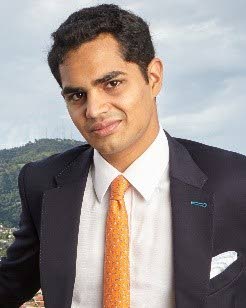The Fighting Temeraire

KIRAN MATHUR MOHAMMED
kmmpub@gmail.com
There have long been rumours that Admiral Zheng He, leading the vast Ming treasure fleet in the 15th century, might have sailed as far as the West Indies. His ghostly ships may soon find somewhere to berth.
The government has hitched up with the state-owned China Harbour Engineering Company (China Harbour) in a joint venture to build two dry-dock facilities. Building them will employ 3,500 people and running them will employ 2,700. We are to use our geographic advantage to entice ships from the expanded Panama Canal. This is solid news. It should give some comfort to the worried and anxious in La Brea being sent home by Petrotrin’s refinery closure. The government should be congratulated.
The current agreement is signed between the National Infrastructure Development Company (NIDCO) and China Harbour. So the project will effectively be State led.
But if this project is truly commercially viable, there should be no shortage of potential private investors or business partners. We should invite them in, now.
According to development economist Dani Rodrik, the easiest way for a poorer country to develop is to import rich countries’ technology. They can do this in either services, or industry. But importing industrial technology has a much greater impact than importing new service platforms. That is because it takes much longer for workers to culturally adapt to new service platforms (or customer service methods), then it does for them to learn to use a new industrial machine.
Given more advanced industrial machinery, workers can become much more productive. So how can the country use this shipping project to gain access to better technology, and put it to work?
Well first, the state could take a step back and bring in a private international investor. Instead of NIDCO directly investing, it could act as a bridge or intermediary for the new private investor and operator, who could hammer out an agreement with the Chinese.
Workers could learn skills from another international firm and its technology that might be later used in new Trinidadian companies. We could build on the success and expertise of our local energy service companies; and replicate their model.
There are any number of potential partners that could be interested, and whose innovations we could benefit from. Vigor (though sadly not ‘vigour’) is the builder of the largest floating shipyard. Sembcorp operates a number of Singapore’s respected shipyards. Robotica in Maintenance Strategies does not produce 1980s neo-noir science fiction: but has developed a drone that allows in-depth inspections of enclosed areas (like ballast tanks). Kongsberg and Yara International are developing the world’s first autonomous container vessel: she sails remotely from next year.
A private, international partner with the Chinese would be better placed to negotiate financing. If a NIDCO/China Harbour partnership obtains financing from a Chinese state-run bank such as China Exim Bank, there is a high likelihood that it will come with a catch. If China is lending at below-market interest rates, they naturally will expect something in return. This type of financing often has fine print requiring Chinese content and workers. The Baha Mar project in nearby Nassau is a cautionary tale of how this can lead to disputes, delays, and even the loss of entire ownership stakes. Project financing is possible. It is unlikely that the issuer would get such favourable terms as ExxonMobil did for their US$720 million Guyana financing (an interest margin of 1.65 per cent, no less), but another private operator would give greater comfort to international lenders or investors.
It is easy to exhort people to re-train; become entrepreneurs; work with new industries and technologies. But adapting is not easy. If you are working and worrying about a family, it is exhausting and difficult to take night classes or enrol in online courses. For someone depressed and out of a job, it can be difficult to summon the energy to even get out of bed. It is much easier to invite multinational companies, and work with existing firms to employ and retrain people. We can then have a surer footing for future entrepreneurship.
This inflow of investment is a significant opportunity. It has shown that we can succeed in trade diplomacy. The state has been successful in driving this. To drive continued, sustainable growth, the state can now step back and act as more of a facilitator. It can work to draw more private companies. Private industry can then take over.
Tapping the ingenuity of private enterprise and finance can afford us greater opportunity: without sacrificing our sovereignty.
Kiran Mathur Mohammed is a social entrepreneur, economist and businessman. He is a former banker, and a graduate of the University of Edinburgh.


Comments
"The Fighting Temeraire"